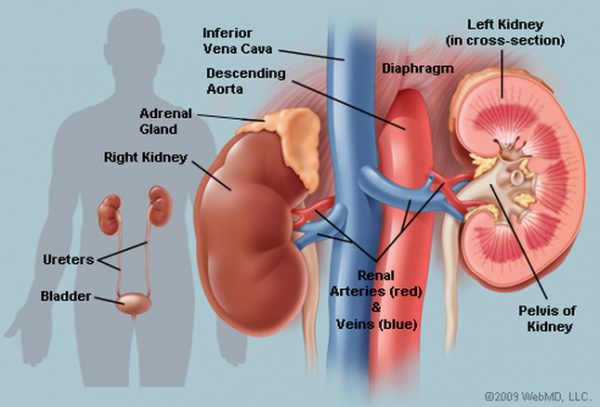A Consultant Nephrologist, Dr. Rotimi Braimoh, has urged the Federal Government to include the treatment of kidney disease into the National Health Insurance Scheme in order to ensure an healthier society.
Braimoh, who works at the Lagos University Teaching Hospital, Idi-Araba, Lagos, made the plea on Thursday in an interview with the News Agency of Nigeria in Lagos.
He spoke on the 2019 World Kidney Day set aside by the International Society of Nephrology on every third Thursday in March to bring awareness to the public about kidney health.
NAN also reports that Braimoh lead a team of nephrologists and nurses to carry out a medical outreach at Apollo Makoko Community area of Lagos, in celebration of the World Kidney Day.

Its theme was: “Kidney Health for Everyone, Everywhere.”
The medical outreach entailed a public awareness campaign on kidney health and a free medical screening to detect the possible risk factors that could cause kidney disease.
According to Braimoh: “The major challenge we faced in the management of kidney disease in Nigeria is inadequate finance.
“In Western countries, this kind of disease is actually under the insurance health scheme so that when people come down with such disease, the insurance takes about 70 per cent of the cost.
“People will take the remaining 30 per cent, but here in Nigeria, every treatment for kidney disease is done out of pocket and that’s quite a big burden on the part of the population.
“Lots of people die mostly, not because of the disease, but due to lack of finance to treat the kidney disease.
“So, if the government can take most of these burdens off the populace, then, I am sure we will have an healthier society.”
Braimoh said that government at all levels should come up with awareness programmes to educate and enlighten the public on major diseases.
According to him, this is key to early detection and treatment.
He said: “As we speak today, kidney disease is counted as the sixth highest causes of death.
“We know that treatment of kidney diseases is quite expensive, and most of the time out of the reach of the average population.
“So, we think that prevention is always better than to wait for the disease to occur and we start looking for money to get treatment.
“In most cases, this is not there, and even the money that is available is not adequate for the required treatment.
“This is why we are here today to create awareness and to also use the opportunity to look for some of the risk factors that we can find out, as an early detector of kidney diseases among the people.
“If we find any in this environment then, we will refer them to our facility for further evaluation and possibly to start treatment before it becomes a problem.”
Braimoh said the community was chosen for the outreach due to its high population and being a financially constrained community.
He said: “We know from experience that most kidney diseases tend to occur in the middle and low socioeconomic group to which the population here belongs.
“It is quite appropriate that we come down to the people in order to enlighten them on what can be done to prevent and possibly to even check themselves for occurrence of kidney diseases.
“We will be screening everybody, from old to young, male and female, because everybody is prone to having kidney disease as long as the risk factors are there.
“We intend to screen no fewer than 500 people for kidney diseases.”
Braimoh, however, advised the general public to adopt the culture of seeking medical advice before taking any medication such as herbs.
He said: “Lots of people take in unhealthy things on the advice of their friends, neighbours, which in the long run, causes damage to the body, particularly the kidney.
“It is not every advertisement that is correct; so people should seek correct and appropriate advice before taking anything into their body.
“Also, abuse of pain relievers can damage the kidney, especially the ones in the non-steroidal anti-inflammatory group.
“People need to be aware and try to ensure that they reduce their intake of such.”
The traditional ruler of Apollo Makoko, Chief Ibrahim Aladetan, commended the team of medical professionals who facilitated the medical outreach to the community.
Aladetan said: “We are happy to have the LUTH team to come here today, because this will be a great opportunity for people who have been waiting to have such screening, but do not have the money.
“Most people here do not have the financial capability to take themselves to the hospital for treatment or screening, but this outreach has brought that service down to our people.
“We hope that many other health institutions and organisations will bring more of this to Makoko for our people to benefit,”
One of the beneficiaries, Shukurat Biliyaminu, said the awareness programme and screening would help improve the habit people adopt in taking care of their health.
Biliyaminu said: “We are happy that these doctors have come here today to inform us on how to properly take care of our health and seek professional medical help when necessary.
“There are a lot of things we take unknowingly that they are not good for the body, but with this lecture, we know better.”
Also, a trader, Doris Ominisan, said the free screening had provided opportunity to many people in the community who do not have financial capability to run such test.
Ominisan said: “I am happy that I got screened today because I have been waiting to go to the hospital for checkup, but there is no money and I know many people here are like that.
“But today, we got tested by good doctors free of charge, and I was referred for further treatment in the hospital.
“We hope to see many more of this exercise in our community.”
NAN.


